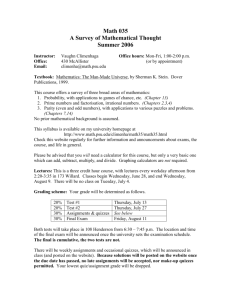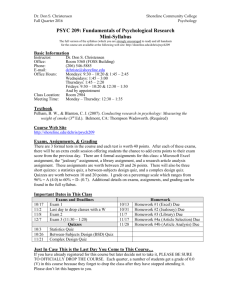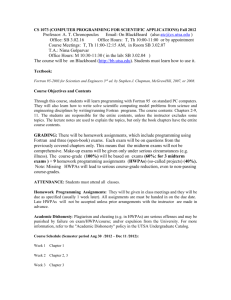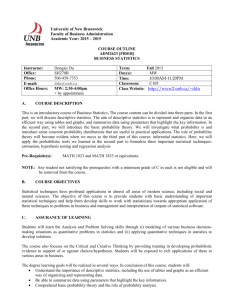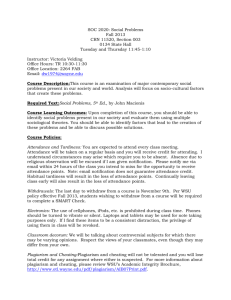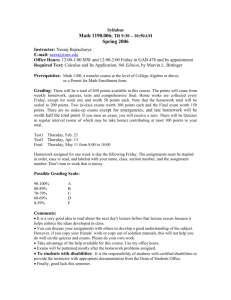BUSN 110 CEN GUNYON FA 11
advertisement
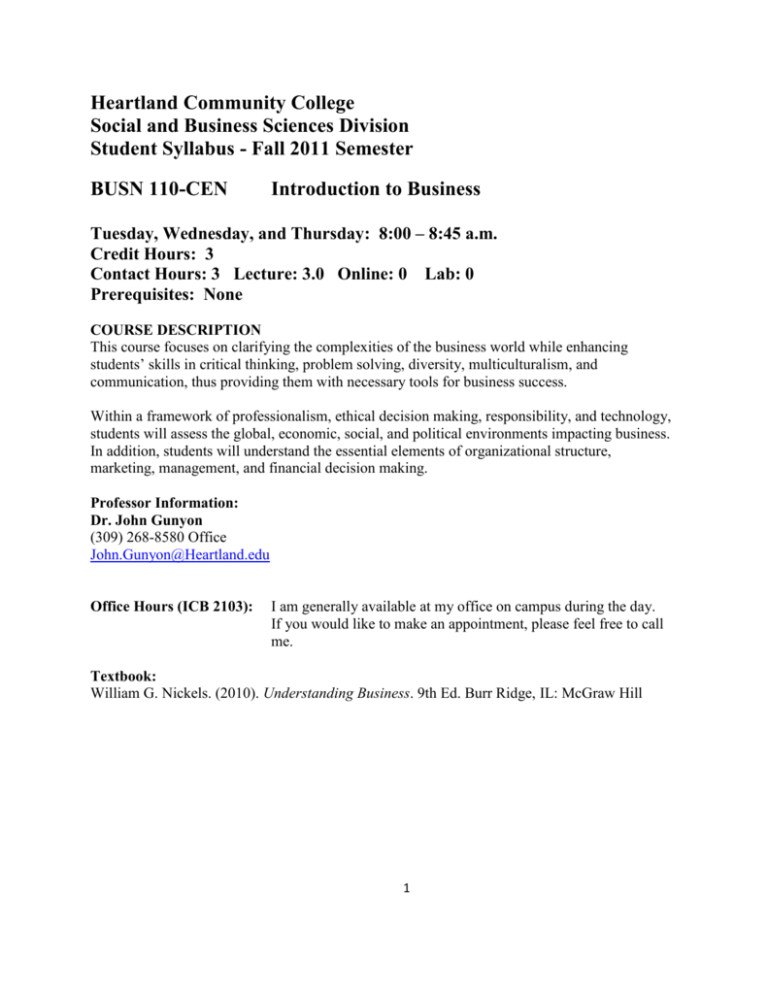
Heartland Community College Social and Business Sciences Division Student Syllabus - Fall 2011 Semester BUSN 110-CEN Introduction to Business Tuesday, Wednesday, and Thursday: 8:00 – 8:45 a.m. Credit Hours: 3 Contact Hours: 3 Lecture: 3.0 Online: 0 Lab: 0 Prerequisites: None COURSE DESCRIPTION This course focuses on clarifying the complexities of the business world while enhancing students’ skills in critical thinking, problem solving, diversity, multiculturalism, and communication, thus providing them with necessary tools for business success. Within a framework of professionalism, ethical decision making, responsibility, and technology, students will assess the global, economic, social, and political environments impacting business. In addition, students will understand the essential elements of organizational structure, marketing, management, and financial decision making. Professor Information: Dr. John Gunyon (309) 268-8580 Office John.Gunyon@Heartland.edu Office Hours (ICB 2103): I am generally available at my office on campus during the day. If you would like to make an appointment, please feel free to call me. Textbook: William G. Nickels. (2010). Understanding Business. 9th Ed. Burr Ridge, IL: McGraw Hill 1 RELATIONSHIP TO ACADEMIC DEVELOPMENT PROGRAMS AND TRANSFERABILITY: Relationship to Academic Development Programs and Transferability: BUSN 110 Introduction to Business is included in the following HCC programs: * Transfer Business * Business Essentials – Certificate * Business Technology Applications – A.A.S. * Business Technology Applications – Certificate * Small Business Management – Certificate ** Information Technology – A.A.S. (Management Information Systems Option) * Required ** Elective BUSN 110 Introduction to Business fulfills 3 semester hours of elective credit for the A.A. and A.S. degrees. It should transfer to most colleges and universities as an elective course. However, since this course is not part of either the General Education Core Curriculum or a baccalaureate major program described in the Illinois Articulation Initiative, students should check with an academic advisor for information about its transferability to other institutions. BUSN 110 Introduction to Business is a required core course for many senior institution business majors, and is articulated at Illinois State University as BUS 110 Enterprise. COURSE LEARNING OUTCOMES Outcomes Discuss stakeholder consequences relating to ethical issues in business. General Education Outcomes CO 5,6 Core Business 110 Values* PR ET RE TE 1,3,4 1-5 1,2,3 Range of Assessment Methods Writing assignments, projects, presentations, participation 1, 2, 3, 4, 5 Discuss the value of diversity and multiculturalism in business. DI 2,3,4 CO 5,6 CT 3 Predict future business opportunities and threats in the national and global environment. PS 2,4 CT 3 Understand the importance of entrepreneurship and small business to the U.S. economy. CT 1 PR 1,3,4 RE 1,2 TE 2,3,4,5 ET 1 PR 3,4,5 RE 1,3 Writing assignments, projects, presentations, participation PR 4 RE 1,3 Oral discussions, writing assignments, projects, presentations, quizzes, exams, participation 2 Oral discussions, writing assignments, projects, presentations, quizzes, exams, participation Examine the advantages and disadvantages of different forms of business ownership, and determine the most appropriate form for a variety of situations. Apply management and psychological theories to solve management problems. Explain how businesses develop and market their products and services. Understand accounting statements and their value to business stakeholders. Describe how businesses manage their finances and obtain funds. PS 3 CT 2 PR 4 RE 1,3 Oral discussions, writing assignments, projects, presentations, quizzes, exams, participation PS 3 PR 3,4 ET1,2,3,4 RE 1,3 PR 4 RE 1,3 Oral discussions, writing assignments, projects, presentations, quizzes, exams, participation Oral discussions, writing assignments, projects, presentations, quizzes, exams, participation Oral discussions, writing assignments, projects, presentations, quizzes, exams, participation Writing assignments, projects, presentations, participation Reflect upon your personal financial condition and identify strategies for improvement. PS 3 CT 2,4 CT 2 CT 1 CT 1 ET PR RE PR RE 1,3,5 4 1,3 4 1,3 PR 4 RE 1,3 TE 2, 3 Writing assignments, projects, presentations, participation * Core Business 110 Values Professionalism P1 Show respect for others P2 Maintain positive attitude P3 Embrace new ideas and possibilities P4 Strive for performance excellence P5 Appreciate scholarship, research, and theory Ethics E1 Recognize the impact of unethical behavior in the workplace E2 Commit to academic honesty and encourage it in others E3 Understand the importance of maintaining confidentiality E4 Understand and respect the intellectual property rights of others E5 Understand the importance of reporting unethical behavior Responsibility R1 Follow through on commitments and meet deadlines R2 Listen and then consider the perspective of others before reacting R3 Be accountable for your actions R4 Realistically assess your contributions R5 Reach out to help others Technology T1 Recognize the pervasiveness of technology in everyday life T2 Effectively use technology in meeting assignment requirements T3 Use technology to create new written text and/or other ways of representing information T4 Locate and evaluate online materials to solve problems T5 Engage in the responsible use of technology 3 Course Outline: 1. 2. 3. 4. 5. 6. 7. 8. 9. 10. Ethics Global Business/Multiculturalism Business Trends Economic Impacts Global Environment Business Ownership Management Marketing Business Finance Personal Finance Study Suggestions Keep ahead of assignment due dates. Develop a weekly study plan. Read and study the required textbook pages each week. Review your notes and any supplementary materials. Complete assignments ahead of due dates. Follow the assignment instructions closely. Ask for clarifications when needed. Contact Dr. Gunyon with any questions or comments throughout the term. Attend every classroom session. METHOD OF EVALUATION: There are no make-ups for late or missed work. Requirements 10 Quizzes @ 10 points each. There are 14 chapter quizzes in the course. The 4 lowest quiz scores are dropped at the end of the semester. 2 Research Papers. The first will be 5 pages of your writing, and is worth 100 Points. The second will be 7 pages of your writing, and is worth 150 points. 6 Unit exams @ 100 points each. There are seven exams in the course. The lowest exam score will be dropped at the end of the semester. Each exam has 25 multiple-choice questions, each worth 4 points. Class Participation TOTAL 4 Points 100 pts 250 pts 600 pts 50 pts 1,000 Grading Scale A B C D F Percentage 90 - 100 80 - 89 70 - 79 60- 69 59 or below Points 900 - 1,000 800 - 899 700 - 799 600 - 699 599 - or below There are no make-ups for late or missed work. All assignments and examinations must be completed according to the due dates on the Course Assignment Calendar. Students are encouraged to complete assignments well ahead of due dates. Students who miss an assignment due to extreme circumstances such as personal illness, death in the family, or military commitment will be allowed an extension if acceptable documentation is provided. REQUIRED WRITING AND READING: Students are assigned readings from the textbook, articles, and reference materials as indicated in the Course Assignment Calendar. All written assignments are designed to enhance the student’s writing and critical thinking skills by analyzing concepts discussed in the course. A minimum of 10 pages of college-level writing (equivalent to 10 typed, double-spaced pages) is required in this course. However, please use only single-spaced writing, as that is the writing format in the business environment. Academic dishonesty in this course will likely result in a course grade of F. The last day to withdraw (W) is November 9th . There are no make-ups for late or missed work. Academic Support Center Services: Library The Library, located in the Student Commons Buildings at the Raab Road campus, provides Heartland students with a full range of resources including books, online journal databases, videos, newspapers, periodicals, reserves, and interlibrary loan. Librarians are available to assist in locating information. For more information, please call the Library (309) 268-8200 or (309) 268-8292 5 Tutoring Services Heartland Community College offers tutoring in various forms at no cost to Heartland students at the Tutoring and Testing Center in Normal and at the Pontiac and Lincoln Centers. Tutors are available at convenient times throughout the week. Study groups are also available by request. For more information about services available at each location, please call the Tutoring and Testing Center in Normal (309) at 268-8231, the Pontiac Center at (815) 842-6777, or the Lincoln Center at (217) 735-1731. Testing Services Testing Services provides a secure testing environment for students enrolled in online, hybrid, and other distance learning courses; have a documented disability; or need to take a make-up exam. Testing accommodations for students having documented disabilities must be arranged by the student through the Office of Disability Services. Testing Services will only administer make-up exams at the request of the instructor. Open Computing Lab The Open Computing Lab provides free computing for HCC students at convenient times throughout the week. The computer lab is staffed by trained Lab Assistants and offers the use of approximately 70 computers, a scanner, a laser printer, and an electric typewriter. Disability Support Services Heartland Community College offers Disability Support Services (DSS) with offices located in the Academic Support Center. DSS ensures that students with disabilities have equal access to the college’s programs, services and activities through the provision of reasonable accommodations as outlined in Section 504 of the Rehabilitation Act and the Americans with Disabilities Act. DSS offers a wide range of services to support students with disabilities, including: assistive technology, document conversion services, personnel, classroom and testing accommodations. Students with a documented disability who wish to discuss academic accommodations can contact disability support services at (309)268-8259. Research Papers Your first paper will be a business plan for your own small business. The second paper will discuss how Wal-Mart became such a successful business. Additional information will be provided during the course. 6 Academic Integrity and Plagiarism Academic Integrity Academic integrity is a fundamental principle of collegial life at Heartland Community College and is essential to the credibility of the College’s educational programs. Moreover, because grading may be competitive, students who misrepresent their academic work violate the right of their fellow students. The College, therefore, views any act of academic dishonest as a serious offense requiring disciplinary measures, including course failure, suspension, and even expulsion from the College. In addition, an act of academic dishonesty may have unforeseen effects far beyond any officially imposed penalties. Violations of academic integrity include, but are not limited to cheating, aiding or suborning cheating or other acts of academic dishonesty, plagiarism, misrepresentation of data, falsification of academic records or documents and unauthorized access to computerized academic or administrative records or systems. Definitions of these violations may be found in the college catalog. Plagiarism Plagiarism is the presenting of others’ ideas as if they were your own. When you write a paper, create a project, do a presentation or create anything original, it is assumed that all the work, except for that which is attributed to another author or creator, is your own. Plagiarism is considered a serious academic offense and may take the following forms: • • • • • • Copying word-for-word from another source and not giving that source credit. Paraphrasing the work of another and not giving that source credit. Adopting a particularly apt phrase as your own. Using an image or a copy of an image without crediting its source. Paraphrasing someone else’s line of thinking in the development of a topic as if it were your own. Receiving excessive help from a friend or elsewhere, or using another project as if it were your own. [Adapted from the Modern Language Association’s MLA Handbook for Writers of Research Papers. New York: MLA, 1995: 26] Note that word-for-word copying is not the only form of plagiarism. The penalties for plagiarism may be severe, ranging from failure on the particular piece of work, failure in the course or expulsion from school in extreme cases. When in doubt, cite the source according to the style your instructor directs. Usually this is APA Style. Don’t be daunted by citing sources which are not books. You can cite everything – including pamphlets, maps, cereal boxes, telephone conversations, movies, television shows, Internet and world-wide web sites. Most cases of plagiarism arise from carelessness or haste. Violators often attempt to excuse themselves by saying that they were not told of the nature of plagiarism.You must not include either the phrases or ideas of another writer in your papers without acknowledgment, otherwise, you are stealing. Plagiarism is dishonest. It is cheating and is subject to severe penalties. It may endanger your whole career. Don’t do it. 7 Philosophy of Grades The Heartland Community College grading philosophy grows out of our vision of educational excellence. This common philosophy provides a framework for each academic division and instructor as they establish their own individual course grading system, evaluation methods, and course policies using the shared general rubrics for letter grades given below. Letter grades serve as a vehicle to promote meaningful evaluation of student achievement, to inform students of academic progress, and, as necessary, to improve student performance, habits, and practices. Using a letter grade as a prerequisite for subsequent courses means we believe that the grade was assigned through a conscious judgment about a student’s readiness to proceed to more advanced study. At Heartland, students’ academic achievement is measured by their mastery of course objectives and content. We challenge students to meet these recognized standards of achievement and we assign grades based on their success in doing so. Simply stated, we believe that the responsibility for academic achievement rests with the student and that holding students responsible for their learning promotes their academic growth. Letter Grade Rubrics “A” This grade represents consistently outstanding performance that demonstrates superior understanding and skillful use of important course concepts. Performance at this level signifies that the student is extremely well prepared to continue with more advanced study of the subject. “B” This grade represents performance significantly beyond the level necessary to achieve the course objectives. Work is of high quality but not consistently at an outstanding level. Performance at this level signifies that the student is well prepared to continue with more advanced study of the subject. “C” This grade represents an acceptable achievement of the course objectives. Performance at this level signifies that the student is reasonably well prepared to continue with more advanced study of the subject. “D” This grade represents less than adequate performance. It signifies questionable readiness to proceed with more advanced study of the subject. “F” This grade reflects unacceptable performance. The student is not yet ready to proceed with more advanced study of the subject, and must repeat the course successfully to receive credit. Notice of Canceled Class Sessions: Cancelled class sessions, for all HCC classes, will be listed under Cancelled Class Meetings in the A-Z Index and under Academic Information in the Current Students page on the HCC Web site. Go to http://my.heartland.edu to learn what classes have been cancelled for that day and the upcoming week. Be sure to check the last column, which might contain a message from the instructor. 8 CLASS SCHEDULE Changes in the Course Assignment Calendar will be communicated to students in advance. Week Tuesday Topics Reading 1 8/23 Taking Risks and making Profits within the Dynamic Business Environment, Quiz Chapter 1 Thursday Chapter 1 2 8/30 Understanding How Economics Affects Business, Quiz Chapter 2 Wednesday, Review and Recap - Exam I (Chapters 1-2) Thursday Chapter 2 3 9/6 Chapter 3 4 9/13 5 9/20 Review Exam 1, Doing business in Global Markets, Quiz Chapter 3 Thursday Demanding Ethical and Socially Responsible Behavior, Quiz Chapter 4 Wednesday, Review and Recap - Exam II (Chapters 34)Thursday Review Exam II, How to Form a Business, Rough draft of your first paper is due Wednesday, Quiz Chapter 5 Thursday 6 9/27 Entrepreneurship and Starting a Small Business, Quiz Chapter 6 Wednesday, Review and Recap, Exam III (Chapters 5-6) Thursday Chapter 6 7 10/4 Review Exam III, Management and Leadership, Paper 1 due Thursday, Quiz Chapter 7 Thursday Chapter 7 8 10/11 Chapters 10, 11 9 10/18 10 10/25 11 11/1 12 11/8 13 11/15 14 11/22 Motivating Employees, Quiz chapter 10 Wednesday, Human Resource Management: Finding and Keeping the Best Employees Human Resource Management: Finding and Keeping the Best Employees (continued), Quiz Chapter 11 Wednesday, Review and Recap, Exam IV (Chapters 7, 10, 11) Thursday Review Exam IV, Marketing: Helping Buyers Buy, Developing and Pricing Goods and Services, Quiz Chapters 13 & 14 Thursday Using Effective Promotions, Section Review and Recap, Quiz Chapter 16 Thursday Exam V (Chapters 13, 14 & 16), Understanding Accounting and Financial Information, Quiz Chapter 17 Thursday Financial Management, Money, Financial Institutions, and the Federal Reserve, Rough draft of your second paper is due Thursday, Quiz chapters 18 & 20 Thursday Exam VI (Chapters 17, 18 & 20) (No Class on Wednesday or Thursday) 15 11/29 Chapters A, B 16 12/6 Working within the Legal Environment, Using Technology to Manage Information, Quiz Chapters A & B Managing Your Personal Finances, Section Review and Recap, Second Paper is due Tuesday, Final Exam (Chapters A, B, & D) (December 8) 9 Chapter 4 Chapter 5 Chapter 11 Chapter 13, 14 Chapter 16 Chapter 17 Chapters 18, 20 Chapter D

